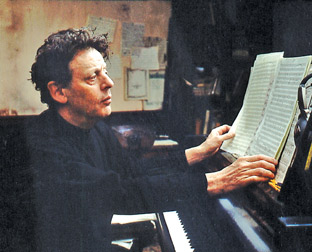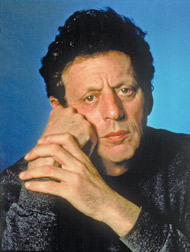Einstein On the Beach

Philip Morris Glass (born January 31, 1937) was my boss when I used
to work at "Looking Glass" studios in Manhattan. I was a sales clerk at
that time largest record store, Tower Records on 4th Street and Broadway
in Manhattan. This was around 1995 or 1994, spring I suppose, a young
guy in his late twenties came to work as a sales clerk at the classical
section. He was wearing glasses and introduced himself "Hi, I am Steven
Farber".
After a while we became acquainted and I told him that I am a film
maker and he said he is a producer and he just finished co-producing
"Music from Low" an album inspired by David Bowie's music from Bowie
album "Low" from 1977. But I was still wondering, why such a successful
person working next to me for $ 5.25 an hour. (Which again is a story we
could talk about later at some point).
Steve one day called me out of the blues and asked me, "hey would you
like to earn some extra money?" I jumped at it and he said to come and
meet him at his office in Broadway. I went in and when I rang the bell
Steve came and opened the door for me and took me into his office and
asked me to sit.
 |
|
Philip Morris Glass |
I saw on the wall a few pictures among them there were a few of David
Bowie and Brian Eno (Who produced many albums for U2 including The
Joshua Tree, which got them their first Grammy for the album of the year
in 1987). Once I was settled Steve showed me what my Job was and what I
needed to do at the studios. I was very glad and he showed me specially
that I should make them coffee if Mr. Glass or anyone else wanted and it
was from Dean and Deluca. It took me several weeks to meet my boss
Philip Glass, and it was not really because I worked there, but I was
doing a small documentary on John Moran, with the Late Allen Ginsburg
and my former boss Philip Glass. Again later I would like to discuss the
fathers of the beat generation late Allen Ginsburg along with William S
Borrows and Jack Kerouac.
Glass is an American music composer, and he is considered one of the
most influential composers of the late 20th century and is widely
acknowledged as a composer who has brought art music to the public
(along with precursors such as Richard Strauss, Kurt Weill and Leonard
Bernstein). Although his music is often, though controversially,
described as minimalist, he distances himself from this label,
describing himself instead as a composer of "music with repetitive
structures" Although his early, mature music is minimalist, he has
evolved stylistically. Philip Glass, early protagonist of the Minimalist
movement, studied with Milhaud and Nadia Boulanger. His first job,
assisting Ravi Shankar on a film soundtrack, heralded the start of his
own successful cinema career, and to date he has scored over fifty
movies.
Early works tended to be abstract, but from the mid-1970s his
attention shifted towards the stage. His first operatic triumph,
Einstein on the Beach, did much to reinvigorate the international
contemporary opera scene. (Which I would like to discuss later in a
different article, because Einstein on the Beach has influenced many
people and one of them is my friend John Moran who did the "Mansion
Family Opera" with the Punk guru Iggy Pop). Profoundly interested in
traditional cultures, Glass often draws on Eastern traditions, as in
"Monsters of Grace" (1997), a multimedia collaboration based on the
writings of Rumi. Currently, he describes himself as a "Classicist",
pointing out that he is trained in harmony and counterpoint and studied
Franz Schubert, Johann Sebastian Bach and Wolfgang Amadeus Mozart with
Nadia Boulanger.
Glass is a prolific composer: He has written works for his own
musical group which he founded, the Philip Glass Ensemble (for which he
still performs on keyboards), as well as operas, musical theatre works,
eight symphonies, eight concertos, solo works, string quartets, and film
scores.
Three of his film scores have been nominated for Academy Awards.
Glass counts many artists among his friends and collaborators, including
visual artists (Richard Serra, Chuck Close), writers (Doris Lessing,
David Henry Hwang, Allen Ginsberg), film and theatre directors
(including Errol Morris, Robert Wilson, JoAnne Akalaitis, Godfrey Reggio,
Paul Schrader, Martin Scorsese, Christopher Hampton, Bernard Rose, and
many others), choreographers (Lucinda Childs, Jerome Robbins, Twyla
Tharp), and musicians and composers (Ravi Shankar, David Byrne, the
conductor Dennis Russell Davies, Foday Musa Suso, Laurie Anderson, Linda
Ronstadt, Paul Simon, Joan LaBarbara, Arthur Russell, David Bowie, Brian
Eno, Roberto Carnevale, Patti Smith, Aphex Twin, Lisa Bielawa, and John
Moran).
Among recent collaborators are Glass's fellow New Yorker Woody Allen,
Stephen T. Colbert and poet and songwriter Leonard Cohen. By 1974, Glass
had composed a large collection of new music for his performing group,
The Philip Glass Ensemble, and music for the Mabou Mines Theater
Company, co-founded by Glass.
This period culminated in Music in 12 Parts (1974), a three-hour
summation of Glass' new music, followed by the landmark opera, Einstein
on the Beach (1976), a five-hour epic created with Robert Wilson that is
now seen as a landmark in 20th century music-theater. This work, the
first in Glass 'portrait' trilogy, was followed by "Satyagraha", created
for the Netherlands Opera in 1980, and "Akhnaten", for the Stuttgart
Opera in 1984.
Over the years, Glass and Wilson worked on several other projects
including Civil Wars (Rome) (1984), the fifth act of a multi-composer
epic written for the 1984 Olympics; White Raven (1991), an opera
commissioned by Portugal to celebrate its history of discovery and
premiering at EXPO '98 in Lisbon and in 2001 at the Lincoln Center
Festival, and Monsters of Grace (1998), a digital 3-D opera. No less
varied are Glass' orchestral works.
There are large-scale works for chorus and orchestra such as Itaipu
(1989) and Symphony No. 5 (1999), a symphonic chorus based on texts from
wisdom traditions throughout the world, Symphony No. 2 (1996),
commissioned by the Brooklyn Philharmonic Orchestra, Symphony No. 3
(1996), Symphony No. 6 (Plutonian Ode) (2001), with text by Allen
Ginsberg, and 'Low' and 'Heroes' Symphonies (1992, 1997), both based on
the music of David Bowie and Brian Eno.
Those were the albums that Steve has co-produced and I had bought
them as an Tower record employee. (Talking about Tower records I will
have to discuss on a later paragraph how I was almost musically tortured
by my composer and my very good friend who composes for my movies
Lakshman Joseph De Saram).
Glass also produced a five string quartets as well as concertos for
violin and orchestra, saxophone quartet and orchestra, two timpanists
and orchestra, and harpsichord and orchestra. His Tirol Concerto for
Piano and Orchestra (2000) premiered at the Klanspuren Festival in Tirol,
Austria, and his Concerto for Cello and Orchestra (2001), commissioned
for Julian Lloyd Webber's 50th Birthday, premiered at the Beijing
Festival.
Glass has composed many film scores, starting with the orchestral
score for Koyaanisqatsi (Godfrey Reggio, 1982), and continuing with two
biopics, Mishima: A Life in Four Chapters (Paul Schrader, 1985,
resulting in the String Quartet No.3) and Kundun (Martin Scorsese, 1997)
about the Dalai Lama, for which he received his first Academy Award
nomination. In 1988, Glass began a collaboration with the film maker
Errol Morris with his score for Morris' celebrated documentary The Thin
Blue Line. "Thin Blue Line" was the first film score of his that came to
my attention as a student film maker at the time.
 |
|
Philip Morris
Glass |
He continued composing for the Qatsi trilogy with the scores for
Powaqqatsi (Reggio, 1988) and Naqoyqatsi (Reggio, 2002). In 1995 he
composed the theme for Reggio's short independent film Evidence. He even
made a cameo appearance in Peter Weir's The Truman Show (1998), which
uses music from Powaqqatsi, Anima Mundi and Mishima, as well as three
original tracks by Glass in 1999, he finished a new soundtrack for the
1931 film Dracula.
The Hours (Stephen Daldry, 2002), which earned him a second Academy
Award nomination; Taking Lives (D. J. Caruso, 2004); and The Fog of War
(Errol Morris, 2003) are his most notable scores for films from the
early 2000s, containing older works but also newly composed music. He
also composed scores for the thrillers Secret Window (David Koepp,
2004), Candyman (Bernard Rose, 1992) and its sequel, Candyman: Farewell
to the Flesh (Bill Condon, 1995), plus a film adaptation of Joseph
Conrad's The Secret Agent (1996).
In 2005 he composed the score for the film "Neverwas", an independent
production starring Aaron Eckhart and Ian McKellen, and in 2006 the
scores for Neil Burger's "The Illusionist" and Richard Eyre's "Notes on
a Scandal" in 2006, garnering his third Academy Award nomination for the
latter. Glass' newest film scores include Scott Hicks' "No Reservations"
(Glass makes a brief cameo in the film sitting at an outdoor cafe),
Woody Allen's "Cassandra's Dream" and Laurent Charbonnier's documentary
Les Animaux Amoureux (Animals in Love, all from 2007), and "Mr Nice"
(Bernard Rose, 2009). In the 2000s Glass' work from the 1980s again
became known to wider public through various media. In 2005 his Concerto
for Violin and Orchestra (1987) was featured in the surreal French
thriller, "La Moustache", providing a tone intentionally incongruous to
the banality of the movie's plot.[71] "Metamorphosis for Piano" (1988)
was used by Ronald D. Moore for the Sci-Fi/Universal production of the
Reimagined Battlestar Galactica, and in 2008, Rockstar Games released
"Grand Theft Auto IV" featuring Glass' "Pruit Igoe" (from Koyaanisqatsi).
"Pruit Igoe" and "Prophecies" (also from Koyaanisqatsi) were used both
in a trailer for "Watchmen" and in the film itself. "Watchmen" also
included two other Glass pieces in the score: "Something She Has To Do"
(from The Hours) and "Protest (Act II Scene 3)" (from Satyagraha).
Steve asked me if I would like to do a small documentary promo on
John Moran, who I later got to know a lot better. He said I would get
some voice cuts of Allen Ginsburg, David Bowie and Philip Glass. This
was while John was recording "Matthiew in the School of Life" in 1995.
I immediately called my friend and producer Doron Benvenisti who is
also the director of the movie "Bitter Sweet", and he came as the
director photography (DP) and we were given an appointment at Looking
Glass studios where I was working. Myself, Steven Farber, Doron
Benvenisti and Esther Levine were there. Glass walked with a black T
shirt and pants.
He was very simple and very humble. He spoke softly and spoke about
John Moran. Steve was saying that I should stop after about twenty
minutes. I went on and on. After about 45 minutes Phillip Glass humbly
and softly asked me, "can I go now?" I was totally overwhelmed. I said
"yes of course".
He got up and shook our hands and walked away from us. I was thinking
to myself, "Wow...when you are at top...how humble you can be." That was
my lesson to be humble, no matter how important you are and it was my
first meeting with Philip Glass, would like to continue the rest of the
article in a fortnight.
|

